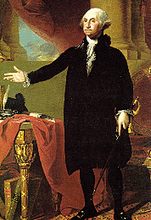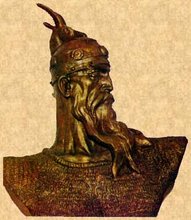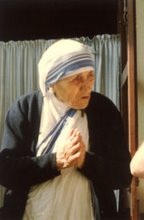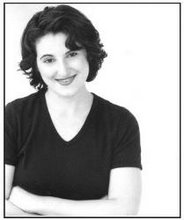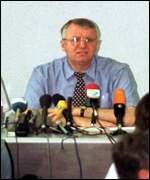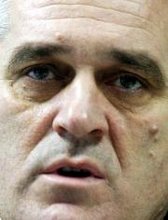PRISTINA, KOSOVO - There aren't many places in Europe where a minister of transport is a national hero whose name is sung in folk songs. But Kosovo is not an ordinary place. The country, a year old last month, is where Fatmir Limaj is succeeding at a job everyone else here has failed at: building roads. Mr. Limaj is in many ways a Kosovo story. In 1998, he took up the gun as a rebel leader, won the first real Kosovo Liberation Army battle against Serbs, and became known as "Commander Steel." He was arrested and later acquitted at The Hague for war crimes. Today, he wears dark suits and patent leather shoes, and cuts ribbons – and deals – over fresh concrete and macadam. In 2007, when Limaj became transport minister, only five miles of four-lane highway existed in Kosovo. Last year, he built eight miles, instituted 24-hour work sites, and is now overseeing the construction of eight additional miles of four-lane roadway. Kosovars love it. Limaj views the transport ministry almost as a personal ministry, a calling to build a country. He's read Barack Obama's "The Audacity of Hope," and seems to offer a "Yes, we can" message to cynical Kosovars weary of unmet promises and muddy roads. With rebel credentials in the majority-Albanian society, Limaj has knocked heads, found consensus with contractors, and mobilized a workforce. He regularly drops in on sites at midnight or later. Last year, a TV crew filmed him directing work at 3 a.m., showing the country that change was indeed under way. "I'm restless by nature, just ask my wife," he says. "Building a country was a dream of my generation. Now, I'm living that dream, but there's a lot to do. "Our people are hard workers, but they need a good manager to channel their energy." Upgrading donkey paths to modern highways An executive from a Western nongovernmental organization, who has lived in Kosovo for several years, describes Limaj as "one of the good ones.... His methods aren't typical, but they are practical, and probably what Kosovo needs right now." Roads in this agricultural society have been so haphazard and poor that travelers from northern Europe routinely got lost, even in recent years. A 21st-century road infrastructure means development. Yet a decade after NATO intervened, and despite a highway budget, little was done. Village roads remained primitive, unpaved, and a nightmare in winter. The main "highway" from the airport to Pristina was two-laned, donkey-laden, and potholed. Yet last year, Limaj's ministry paved or repaved nearly 500 miles of highway – adopting a strategy of connecting villages with one another and with key arteries. "It was so much road that we all started to wonder why it hadn't happened before," says Artan Mustafa, political editor at the Express newspaper. "Obviously, one reason is because Limaj has power. No one can say to [Commander Steel] that the road won't go through here or there. He tells you, you don't tell him." Speaking in his office near the new parliament building, Limaj explains his passion for his homeland. "I feel that 24 hours a day. It was a dream of my youth, to have a free country," he says. "If you asked me 10 years ago, I would have said that freedom was impossible. But God gave us the opportunity." Fall of Wall a test of patience Limaj's own story began when he was a student leader in the early 1990s. The Berlin Wall had fallen, but Serbian strongman Slobodan Milosevic had revoked Kosovo's special status in Yugoslavia. The Albanian, 90 percent of the population, lived a second-class existence under brutal police-state repression – checkpoints, arbitrary killing, torture – as Serbs revived a deeply felt national myth of Kosovo as their spiritual heartland, something disallowed under Yugoslavia's longtime leader, Marshal Tito. "The rest of Europe was moving in ways unimaginable to us," he says. "The spirit of East Europe was everywhere. People in Europe were breathing easier. But for us, the opposite was happening. Europe was moving forward, and we were moving backward."
Public debate wasn't allowed in the new Kosovo and students rebelled. "We wanted our voices heard in federal Yugoslavia," Limaj recalls. "We wanted to warn the center how dangerous the program of Milosevic was, to stop this crackdown." For a decade, Limaj and Kosovo waited as the political and spiritual leader of Kosovo, Ibrahim Rugova, reacted to Serbian tactics with a Gandhian strategy of patience and nonviolence. A tipping point for Kosovars arrived with the US-led Dayton peace deal on Bosnia. "After Dayton, all our hopes and dreams fell," Limaj says. "That Milosevic could kill with impunity for years, then present himself as a man of peace ... this was totally depressing for us. There was no hope. We saw what he was doing here. It's true, if a normal person has choices, he would never choose war. But it was either leave Kosovo, or organize ourselves to resist." Limaj faced justice and earned respect The former commander plays down his KLA hero status. But Limaj was the first to switch KLA tactics – characterized by guerrilla skirmishes in villages and hiding in the hills – by confronting Serb forces in the open. His units eventually held two main highways and sheltered 85,000 people, a hospital, and a radio station. Last week, the Yugoslav war crimes tribunal at The Hague offered its first verdict on the Kosovo war. Four Serb generals were found guilty of using systematic force against civilians. But the tribunal acquitted then Yugoslav President Milan Milutinovic, citing Milosevic as mainly responsible: "In practice, it was Milosevic, sometimes termed the 'Supreme Commander,' who exercised actual command authority … during the NATO campaign," stated chief judge Iain Bonomy. Milosevic died in his cell at The Hague in 2006, during his defense against genocide charges in Bosnia and Kosovo. Limaj's time at The Hague remains a sensitive one. He was arrested for crimes while serving as KLA commander of the Llapushnik region. He denied guilt, but agreed to face charges. "As much as I didn't agree with the accusation, I felt it was our responsibility to respond," Limaj says. "So I said I would go to The Hague, and was sure justice would prevail." It was a lonely, worrisome time for Limaj. When he was released in 2005, he bitterly criticized Kosovo authorities for a lack of logistical legal support that he felt would have shortened his trial. "I was not going to be a man afraid of justice. But in a situation like that, you have a million thoughts running through your mind." When Limaj returned, thousands of Kosovars made a pilgrimage to his home. Two attempts to run for mayor of Pristina failed. But Prime Minister Hashim Thachi gave him the transport ministry, which he relishes. What Limaj took from Obama's "Audacity of Hope" was the new president's community organizing in Chicago. "He went house to house to understand the people, their hopes and dreams, so by the time he ran for president could speak to everybody." That will be a task in Kosovo, still divided between Albanian and Serb. "Kosovo's intentions are humane… we don't want to harm or do damage to others… but allow everyone live together in a new state." Limaj's biggest test may be ahead. Having won hearts as a man who gets things done, and whose name has been added to a centuries-old Albanian heroic folk song – he must now finish the airport road, as well as a new road to Skopje, and navigate construction difficulties. "He's won the initial battle, but now is the real test," says a UN official. Mr. Mustafa, the editor, adds that "Everybody loves Limaj, but I also long for the day when an ordinary civil servant can give an order, and it is followed." | 

